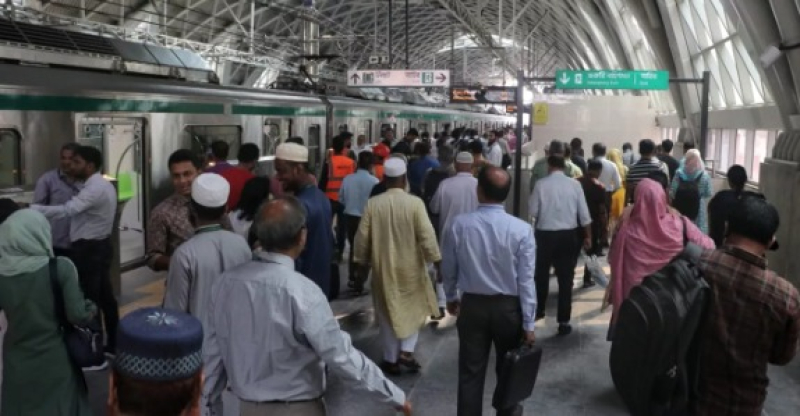- US Supreme Court Voids Donald Trump Global Tariffs |
- India looks forward to engaging with new govt in Bangladesh |
- No more running after doctors, services to reach doorsteps |
- ‘Revolutionary’ shift in economy, stock market soon: Amir Khashru |
- Stocks end week sharply lower as DSE, CSE indices tumble |
Dhaka embraces Metro Rail efficiency
Bus services on Mirpur-Motijheel route suffer a blow

Dhaka embraces Metro Rail efficiency
Feb 29 - Dhaka’s ambitious Metro Rail service, connecting Uttara to Motijheel, has significantly impacted the traditional public transport ecosystem, especially affecting bus services on the Mirpur-Agargaon-Farmgate-Paltan route. The introduction of this modern transit option has led to a sharp decline in bus ridership, with operators reporting a 30-40% reduction in the number of buses on this route.
Transport proprietors are bracing for a further decline in bus numbers as the warmer months approach, predicting that the allure of the metro’s air-conditioned comfort will draw even more commuters away from buses. The diminished appeal of buses, once a staple for Dhaka’s commuters, is particularly noticeable during peak metro operational hours, despite an observable decrease in traffic congestion.
The potential extension of metro rail service hours beyond the current 7:10 am to 8:40 pm timeframe threatens to exacerbate the financial strain on bus operations, prompting owners to consider rerouting their fleets or selling them off. “From a daily tally of 500-600 buses, we’ve plummeted to just 300-400 buses on the Mirpur-Agargaon-Farmgate-Paltan route,” stated Md Shahjahan, Managing Director of Shikhor Paribahan, highlighting the scale of the downturn.
Shikhor Paribahan, which previously operated up to 90 buses daily, has seen its fleet reduce to 60-65. Similarly, Bikalpa Auto Service has halved its operations, from 40-50 buses to merely 20-25, according to Managing Director Mahbubur Rahman. This trend has left employees like Aminul Islam, a bus helper for Shikhor Paribahan, fearing for their livelihoods as passenger numbers dwindle.
While CNG-run auto-rickshaws and bike ride-sharing services have also felt the metro rail’s competitive pressure, their income reductions have been less severe. However, for commuters like Ashraful Alam, the metro’s efficiency outweighs any cost savings offered by buses, with the metro rail slashing his travel time to Motijheel dramatically.
The metro rail’s positive impact on traffic flow and discipline along the Mirpur-Motijheel route has been acknowledged by Abu Raihan Md Saleh, Joint Commissioner (Traffic North) of the Dhaka Metropolitan Police (DMP).
He also added that traffic movement has become faster on the Uttara-Airport-Mohakhali route due to metro rail services and the opening of Elevated Expressway, despite congestion persisting in other parts of the city.
Prime Minister Sheikh Hasina’s phased inauguration of the metro rail’s sections – the Uttara-Agargaon segment in December 2022 and the Agargaon-Motijheel section in November 2023 – has introduced a new era of commuting in Dhaka.
With extended operational hours implemented since January 2024, the metro offers a 30-minute commute from Uttara to Motijheel, presenting a compelling alternative to traditional bus travel amidst Dhaka’s notorious traffic congestion.-UNB

